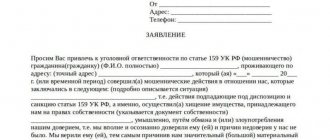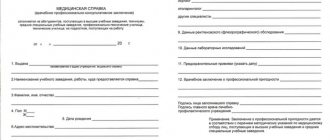The legislative framework provides protection for the safety of property values of Russians from attacks by criminals. When committing a crime, every citizen has the right to file a statement with the police about damage to property; a sample can be taken at the department. Correct execution of the document will facilitate the investigation procedure and allow the culprit to be punished.
Contacting the police.
The legislative framework
A number of property assets are in the personal possession of Russian citizens:
- real estate;
- personal vehicles (cars, motorcycles, mopeds, scooters, etc.);
- antiques, paintings by famous artists and other interior items.
Intentional or unintentional violation of their integrity is defined by law as damage. It can have 2 degrees:
- Partial. It manifests itself as incomplete damage to property with the possibility of restoration through repair or restoration.
- Full. Expressed by final destruction or destruction.
Federal laws.
Intentional damage to property belonging to individuals is regulated by Article 167 of the Criminal Code of the Russian Federation. The legislative act specifies the sanctions imposed on the offender when his guilt is confirmed in court.
Responsibility and penalties for unintentional damage to personal property of citizens are discussed in Art. 168 of the Criminal Code of the Russian Federation.
To open a criminal case regarding the crime in question, it will be necessary to estimate in monetary terms the amount of harm caused. Procedural proceedings begin in the following cases:
- the cost of property damaged as a result of the deliberate actions of the offender is at least 2,500 rubles;
- damage caused unintentionally is estimated at an amount exceeding 250 thousand rubles.
Some nuances of filling
Events must be presented clearly and in order so that the description reflects the actual course of events. The facts of the case must be succinct, complete and justified. According to the chronology of events, the text is divided into paragraphs. The application must clearly indicate which right of the bearer was violated, and which article of legislation provides for the protection of this right (link to a specific article or legal act).
A claim for compensation for damages resulting from damage or destruction of property has time limits. The statute of limitations is three years from the date the incident occurred. It is impossible to be sure that the court will rule in favor of the plaintiff. It is based on the extent to which the defendant’s responsibility for the crime has been proven.
What is meant by property damage?
In Russian legislation, property damage means causing damage to someone else's property. Based on the nature of the offender’s actions, damage is divided into intentional and unintentional, and based on the amount of financial losses - into causing minor and major losses.
Damage to property.
Intentional damage
Criminal intent consists of deliberately causing harm, destruction or destruction of property belonging to individuals. If an attacker does not realize the illegality of his actions and the likelihood of damaging someone else’s property, Article 167 of the Criminal Code does not apply to him.
The legislation of the Russian Federation provides for the punishment awaiting an offender who intentionally causes damage to the personal property of citizens:
- fine up to 40 thousand rubles. or withholding three months' earnings in favor of the state budget;
- unpaid correctional labor;
- administrative arrest or imprisonment for up to 24 months.
If criminal actions related to damage to property led to the death of a person or other serious consequences, the perpetrator is convicted under clause 2 of Art. 167 of the Criminal Code of the Russian Federation and sentenced to 5 years in prison. A similar amount of punishment awaits attackers who cause damage to someone else’s property for hooligan reasons. The same sanctions are imposed when a crime is committed in a socially dangerous manner.
Damage to someone else's property.
Unintentional damage
Damage to property due to negligence in the Criminal Code of the Russian Federation is regulated by Article 168. Unintentional damage occurs as a result of a fire, explosion, car accident and other situations not related to purposeful actions. An offender found guilty by a court under this article will face the following sanctions:
- Fine to the state budget. The amount is determined based on the results of the procedural proceedings. The maximum amount is the annual salary of the defendant or 120 thousand rubles.
- Unpaid work - forced labor for up to 12 months or correctional work for up to 2 years. In some cases, the judge imposes a sentence of 480 hours of compulsory voluntary work.
- Imprisonment or restriction of freedom for a period of up to 12 months. Such sanctions await the offender who, through careless actions, has caused damage on an especially large scale.
Other penalties
For intentional and unintentional damage to property, not only criminal, but also administrative liability can be imposed.
Thus, according to Article 7.17 of the Code of Administrative Offenses, for intentionally causing harm to someone else’s property, the guilty person may be brought to administrative liability, which is expressed in the payment of a fine in the amount of three hundred to five hundred rubles.
However, such a minor administrative fine can be imposed only if the cost of damage caused to property is no more than two and a half thousand rubles.
How to assess damage
To make a decision on the case under consideration, the injured party will need to provide human rights authorities with information about the price of the destroyed property or the cost of restoration work. In situations with arson, flooding of apartments, and intentional damage to cars, it is recommended to use the services of experts. After the survey, appraisers clarify the amount of losses.
Estimation of the amount of damage.
If the damage is minor and paying for an expensive examination is not practical, the victim can himself assess the extent of damage to personal property. To do this, you will need to find similar items for sale and find out their market price or present copies of receipts and certificates of acceptance of restoration work.
Further actions
Based on the statement of the victim, the criminals are brought to justice, however, the essence of the victims’ claims usually lies not only in fair punishment for the perpetrators, but also in compensation for their own losses. To do this, you need to re-apply to the court that heard the case with a claim for financial compensation.
Let us look at a number of nuances that you need to know when applying to the courts.
To receive compensation, you must provide the court with information about the value of the damaged or destroyed property. In cases where we are talking about arson, flooding of apartments, or intentional damage to vehicles, you need to contact an independent expert company. Appraisers will determine the current value of the item, and the report prepared by such organizations is accepted by the court as unconditional evidence.
However, there are often situations when the damage caused is insignificant, and the costs of expert services far exceed the actual damage. Here you will have to act independently, providing as evidence data on the price of property with similar characteristics or receipts for expenses incurred for restoration.
Important!
If a claim for compensation is filed during investigative actions, payment of state duty is not required. This practice does occur. If the accused does not agree with the plaintiff's demands, he has the right to challenge the amount of compensation by filing a motion to reconsider the case. Let us immediately note that this is a very labor-intensive process, and the applicant will most likely be required to provide reasoned justification for the legal proceedings.
How to write a police report correctly
The police are the first authority to receive information about criminal activities. There are 2 ways to report an offense:
- Oral. The victim goes to the nearest police station and explains to the officer on duty the circumstances of the incident. The employee records the testimony in the protocol.
- Writing. The citizen writes a statement according to established standards. A sample must be provided at the department.
Sample crime report.
Document structure and sample
The structure of the application includes the following sections:
- In the upper corner on the right are the details of the authority of appeal (number and address of the police station, rank, surname and initials of the chief), below - the applicant’s data (full name, place of residence and registration, telephone number for contact).
- Document's name. In the center of the page, in capital letters, write “Statement of property damage.” There is an indent of one line between the name and the header.
- Description. In the most voluminous part, the circumstances of the incident are stated in business language.
- Requirements. Referring to legislative acts, they express a request to take appropriate measures to criminally or administratively punish the offender.
- Conclusion. Contains the date of filing the application and the signature of the victim.
The document is accompanied by the results of an examination to assess the cost of damaged property, estimates for restoration work or checks for payment for repairs.
Deadlines for submission and review
Since the statute of limitations for cases involving damage to someone else’s property is limited to 3 months, it is recommended to report to the police immediately if damage is detected.
Application processing time.
Such applications are considered by human rights officials without delay. If the accusations are justified, operational measures are taken to investigate the offense.
The police are given time to verify the information received. The minimum period for analyzing information is 3 days. If additional research and examination is required, the period is extended to 30 days.
Sample lawsuit
A claim for compensation for damage caused is drawn up according to this sample.
Therefore, damage, and even more so the destruction of personal property by a stranger, is perceived very harshly by the owner, even if the value of the damaged item is small.
What to do if your property has been damaged by someone? There are several options.
Where to contact?
Depending on the amount of damage and the circumstances under which it was caused to the victim’s property, the act is classified under the criminal or administrative code. In addition, when it comes to a poorly performed service, the law on consumer rights is involved.
Damage or destruction of someone else's property on a large scale, committed intentionally (deliberately), is punishable by Article 167 of the Criminal Code of the Russian Federation.
- For accidental, that is, caused by negligence, damage or destruction of property, the penalty is specified in Article 168. If an act committed against your property falls under this article, you should also contact the police.
- When the value of the damaged property is small (up to 2,500 rubles), but you still want to punish the offender, you should write a statement to the police, but with a request to bring the offender to administrative responsibility.
- The prosecutor's office is usually contacted when a complaint about property damage has been refused at the police station.
- In order to receive compensation for your damages, you must file a claim in court. In principle, compensation for damages can also be considered during a meeting dedicated to a criminal case. But in order to be sure to receive compensation, you should still take care of it.
Next, we will talk about the form for reporting property damage to the police.
Document form
- When it comes to a statement sent to the police, you should know that you do not have to write it, especially in advance. When you arrive at the department, you can tell the employee about what happened, after which he will draw up a protocol from your words, which you sign.
- If you want to personally make sure that the application will definitely get the case moving, you can write it according to the sample provided by the police or fill it out at home by finding the appropriate form on the Internet. After submitting it, ask for the corresponding coupon.
- Otherwise, the situation will be with the claim. This paper must be submitted in writing. In addition, in order for it to be accepted for consideration, it is necessary to comply with the requirements established by law and the deadlines for filing an application for damage to property.
We invite you to read: Complaint to a supplier about a low-quality product: Sample quality complaint
How to compose?
As is clear from the previous section, a statement and a claim are drawn up differently. Let's consider the principles of their creation separately.
In principle, both an application for administrative liability and an application for a crime are created according to the same template:
- “Hat” is written at the top right. It is indicated to whom the application is addressed (full name, title and position of the head of the department), as well as from whom it was received. Here, in addition to personal information, you must provide contact information so that you can be contacted;
- Descriptive part. Here you need to succinctly and briefly state the essence of the matter. Just the facts. There is no need to describe your emotions;
- Actually a request (for prosecution, capture, etc.). In an administrative case, the requirement may also be indicated at the beginning of the descriptive part.
- Signature with transcript and date.
For sample applications to the district police officer regarding damage to property and theft, see the appendix.
Sample statement to the police - 1
Sample statement to the police - 2
Lawsuit
The statement of claim shall include the following information:
- The name of the court to which this paper is sent;
- Details of the plaintiff;
- Information about the defendant, his location;
- The essence of the appeal;
- Grounds;
- Cost of claim;
- An indication of compliance with pre-trial measures (that is, contacting the defendant for the purpose of reconciliation before filing a claim);
- List of attached papers;
- Date and signature.
In addition, in order to achieve a better result, you can use the following instructions:
- It is advisable to present events in chronological order. This way the narrative turns out to be more complete and accurate, better reflecting the real course of events;
- The facts must be presented concisely and completely. The feeling of reticence that arises after reading will raise the suspicion that you have hidden something;
- Divide the text into paragraphs according to the events being presented;
- Don't jump from thought to thought;
- If you doubt the jurisdiction of a case, do not indicate the norms of law you are referring to. They will be specified in court.
An example of a claim containing a request for compensation for damage as a result of an accident can be found below the article. There you will also find a statement of claim for consumer protection.
Sample statement of claim for damage to personal property
Sample statement of claim for damage to personal property - 1
Sample statement of claim for damage to personal property - 2
Sample statement of claim for damage to personal property - 3
Sample statement of claim for damage to personal property - 4
Where to contact
Depending on the tasks that the victim sets when contacting law enforcement agencies, the application is sent to one of the following authorities:
- the police bringing criminals to administrative or criminal liability;
- the prosecutor's office, which receives complaints about the inaction of police officers if they refuse to respond to an appeal;
- judicial authorities considering claims for compensation for damage.
To the local police officer
The appeal is made by drawing up an application using a sample similar to the document submitted to the police. In the header, instead of information about the head of the department, the data of the district inspector is indicated, including rank, position, surname and initials.
Contact the local police officer.
The narrative includes the place, time and detailed circumstances of the crime. The style of presentation is informational, without emotional overtones or expression of hostility towards the culprit.
It is advisable to write reliable information about the alleged attacker, for example, full name or address.
To the prosecutor's office
Citizens who have been refused by police to investigate a crime involving property damage can send a complaint to the prosecutor. There is no established form for filing such an appeal; it is recommended to adhere to the uniform standards accepted by legal practice.
Contact the prosecutor's office.
The prosecutor's service has 7 days to consider the application. If additional verification is necessary, the deadlines are extended to 30 days.
To court
If the victim wants to compensate for financial losses and moral damages, a lawsuit is filed. The registration rules are specified in Art. 131 Code of Civil Procedure of the Russian Federation. Documents drawn up in violation of established standards are returned to the plaintiff for revision.
At what age are they held accountable?
Punishment for causing damage to someone else's property awaits any citizen of Russia who has reached the age of 16. According to current legislation, teenagers over the age of 14 who commit a crime under aggravating circumstances are brought to criminal responsibility. Such cases include damage to property associated with harm to human health or life.
Age for prosecution.
When it comes to court
Upon completion of operational activities, the police establish the offense and identify the person responsible. In this case, procedural proceedings are initiated. The victim will need to file a statement of claim.
The instance of appeal depends on the amount of damage: if the amount of losses does not exceed 50 thousand rubles, the claim is submitted to the magistrate’s court; in case of a larger amount of damage, the case is considered by district and city departments.
Consideration of the application in court.








